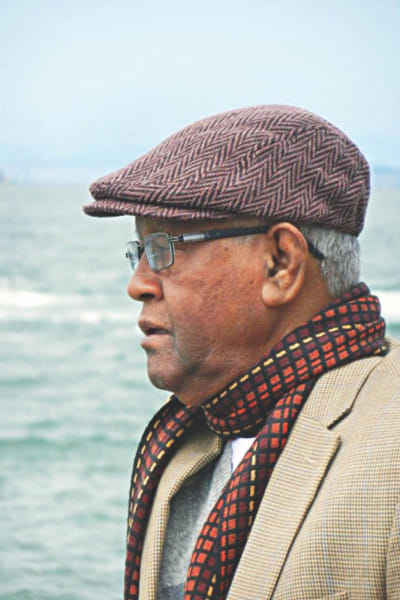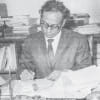The whistle doesn't pull the train

I was a junior lecturer when I had the privilege of working alongside Professor Nurul Islam, who was chairing the departmental admission test committee at Jahangirnagar University. As a student who had just entered the upper echelon of the academia, I became privy to the testing mechanism: setting up of question papers, typing them in manual typewriters, running them through the stencil machines, and stapling the pages together, counting them for individual packets, preparing them for exam halls—all done by the members of the admission committee.
We worked like a family in sync like a big engine with Prof Islam in the lead. I was intrigued by the essay topic that Prof Islam had set for the test: "Don't brag! The whistle does not drag the train." As I write this obituary for my mentor who passed away on November 22, for some strange reason that particular line from nearly 24 years ago pops up in my head as a statement that defines our professor. He has always been an extremely erudite person with remarkable humility. As the founding Chair of the Department of English, Jahangirnagar University, he contributed immensely to its growth leading it from the front without making any show of it.
He was one of the few Bangladeshi teachers of his generation to get a PhD in English literature from the UK. Dr Islam attended the University of Ulster in Northern Ireland, following his studies at the University of Dhaka and University of Leeds. His dissertation on Graham Greene was published as a monograph titled Graham Greene, An Inverted Humanist, and he even had the good fortune of meeting the author. We in turn had the good fortune of reading The Quiet American under him in our MA class, and was introduced to the complicity between America and Vietnam through an allegorised love relationship.
Dr Islam joined Jahangirnagar University in the early 70s and taught there until the mid-1990s. He started his career at Chittagong University before assuming the responsibility of a new department. Under his able leadership, with the proper guidance from the then VC Prof Zillur Rahman Siddiqui, the department recruited some renowned scholars such as Abu Rushd Matinuddin, ANM Bazlur Rashid, Azhar Hossain, Mohammas Rafiq, Shafi Ahmed, Shaheen Kabir, Afzal Hossain, Harunur Rashid, and Khaliquzzaman Elias, among others, who gave the department both a solid footing and a different touch. The department invited Prof Amalendu Bose of Jadavpur University to draft its syllabi. Instead of traditional honours programme, JU English department introduced course system with Major and Minor in the late 70s. Prof Islam took a lien to teach at King Saud University, KSA, and also at Michigan State University as a Fulbright Scholar. After his retirement from JU, a campus which he made his home, he joined Eastern University as its Vice Chancellor.
He used to tell us about his fanciful project of spending all his money that he earned while teaching in the Saudi Arabia in making a lavish house at Jahangirnagar Housing Society—Arunapolli. He named it "Retreat," and would spend most of his weekends there. "A newspaper and a steamy coffee in a sun basked wintry morning, what more do you want?"—he would tell his colleagues.
Prof Islam was a father figure for all of us. One of our classmates got into trouble once for a rash comment about JU male students. The opportunity-seekers took advantage and made her a persona non grata. As her classmates, we went to Prof Islam who was then the Dean of the Arts faculty. "Put yourself in her shoes…" one of us reasoned, and a senior professor reacted to the shoe reference without realising the cultural context. Prof Islam saved us from the wrath of the angry professor as well as from the students with hurt egos.
He was a politically conscientious faculty, but never allowed his ideology interfere with his professional judgement. In a post-75 era, he was the founding president of the JU chapter of Bangabandhu Parishad. When I went to meet him after joining the department, he just told me: "Remember that you have earned a rare First Class, and nobody can take that away from you. You don't have to join any political party." My respect for Prof Islam increased manifold on that day.
Once a senior friend of mine was stopped from sitting for his exams as he did not have the required 75 percent class attendance. Prof Islam went to the Chair, and told him: "Are you punishing the boy or his family? Just think of the pain the family will have to endure if the graduation of this boy is deferred by a year." My senior brother got his clearance to attend his exams.
Prof Islam was extremely helpful. Whenever he would ask me to do something for Eastern University, such as giving a lecture or serving on the viva board, he would make it sound like I was doing him a favour. Such was his humility. He was a voracious reader. He was always seen reading something. So much so, I once saw one senior brother going to the exam hall with a newspaper. People normally carry books or notes, but I was curious to see him carrying the newspaper. "Well, if I put it on the table, Islam sir is sure to pick it up and get engrossed in reading, which will allow us all to talk during exams." Indeed, he was a simple man who could be lost in his own world.
At the same time, he was a liberated soul. His daughter Nadiya Shabnam, one of the promising Bangladeshi writers in English, was telling me that Prof Islam bought her a copy of Simone de Beauvoir's Second Sex when she was only 14. Although a pious man, he would always hum Tagore's songs. According to his wife, Prof Sauda Akhter, who was there at the time of his death, he made his transition to the next world listening to Tagore's verse: Mone re tai koho je/ bhalo mondo jahai ashuk, shotyore low shohoje (Come what may, Tell your Mind, To accept truth in an easy way).
Dr Islam was laid to his final rest at his ancestral village in Chandpur.
Shamsad Mortuza is Professor of English at the University of Dhaka. Currently on leave, he is the Head of the Department of English and Humanities at ULAB.







Comments